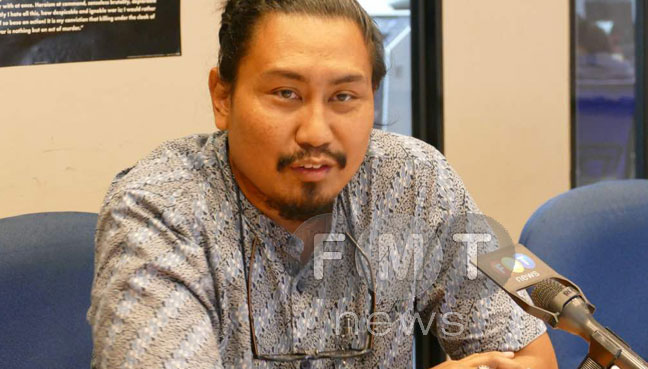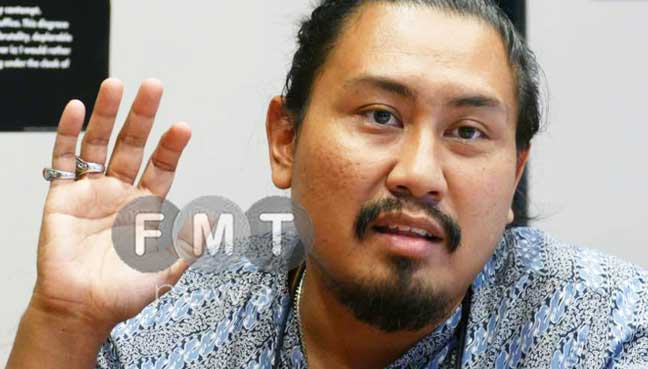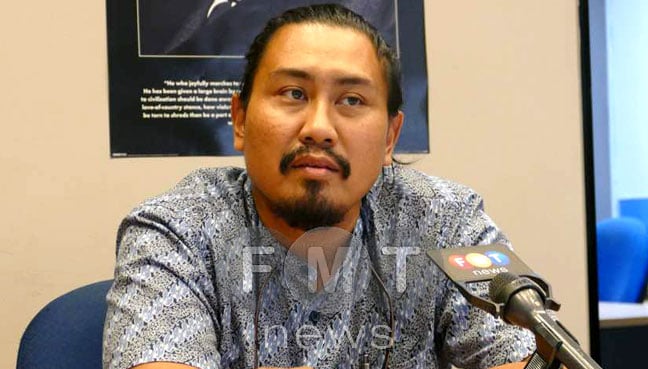Banned author warns of likely conservative backlash to hasty changes.

PETALING JAYA: It’s hard to define historian Faisal Tehrani’s real career. From conservative activist to liberal human rights campaigner, the high-profile author seems to have been part of both ends of the political and religious spectrum.
At 44, he seems at ease with the apparent contradictions in his own history.
He has written more than 20 widely read academic papers on the subject of Malay history.
He has also written plays, short stories, and novels, which have won him literary prizes and awards but some were controversial enough to be considered threats to public peace by the previous government, and banned.
More recently, he has begun speaking out on human rights, and has emerged as a critic of Islamic bureaucrats in Malaysia.
As a result, Dr Mohd Faizal Musa, his original name and that by which he is known at the university in which he teaches, has found himself shunned by fellow academics and students.
Until recently.
In the wake of the fall of Barisan Nasional in the May 9 polls, he suddenly found that people were much nicer to him and more interested in his work. He attributes this to the euphoria following the victory of Pakatan Harapan, and people’s anticipation of change and greater openness.
Academics and artists like him, long shunned due to incompatibility with the established system, seem to be better accepted now.
“The week PH took over the administration, I could immediately feel the fresh air of change. Students who had been afraid to even say hello to me were suddenly friendly,” he told FMT in a recent interview.

But he is still far from optimistic about serious change. When asked if he feels the ban on his seven books will be formally lifted by the new powers in Putrajaya, he cited the police investigation of rights lawyer Fadiah Nadwa.
“With Fadiah being charged, I don’t think my work will see the light any time soon.” he said, referring to an article by her, allegedly critical of the monarchy, which is currently being probed by the police.
Faisal began writing novels in his teenage years, winning several awards. Perlis mufti, Mohd Asri Zainul Abidin was a high school contemporary. But both have different worldviews today, especially when it comes to Islam.
Although Faisal graduated in shariah from Universiti Malaya, his real interests lay elsewhere.
He became interested in the historical journey that the Malays in the archipelago took, in order to glean an understanding of what created their present politics and norms.
He also took a keen interest in “the others” of the Muslim community, including Shias, who are considered deviant by Malaysia’s Sunni-Islamic authorities.
In fact, it seems that the “Tehrani” in his nom de plume has something to do with his interest in Shia Muslim literature.
“People thought I was moving ideologically towards Iran,” said Faisal. “But I am not a Shia. I take the good parts from every religion. I don’t think I can really be labelled as anything.”
Faisal’s past was however a far cry from his present image of someone who stands up for human rights, including those of lesbians and gays, as well as religious minorities.
At one time, he supported the Islamist party PAS, and his writings were easily categorised as conservative.
“My perspective changed in 2010 when I went to Geneva and Dublin for human rights training. While there I met liberal activists from all over the world.
“This helped me transform my opinions. Thinkers and writers need to open themselves to new ideas. And if those ideas challenge you, and if you then need to adapt your beliefs, then you should do it,” he said.
‘Institutionalised’ Islam
Currently a Research Fellow at the Institute of the Malay World and Civilization at Universiti Kebangsaan Malaysia, Faisal has often looked at Malay society in unconventional ways.
He says that Malay pre-Islamic history is something often forgotten by historians.
“I believe that we need to open our minds to look at the good things in our history. The Malays were once Buddhists and there are so many good values that stem from that.” he said.
“Why are we throwing all that away? We need to take the good from wherever we find it. This is what Islam teaches. There is a hadith that says whatever is good is part of Islam.”
Faisal has always spoken out about the manner Islam is practised in Malaysia. His main fear is “institutionalised Islam”, which he said was not just a recent development.
He said Islam has gradually changed, becoming more rigid over the centuries through creeping Salafism.

The first things the early Muslims of Melaka were taught about the religion was its rituals.
“They were not taught about theological or moral values. That is why people now are focusing on halal laundry,” he said, in an apparent reference to the controversy last year over whether it is acceptable for non-Muslims to wash their clothes at laundrettes frequented by Muslims.
Faisal is cautiously optimistic about changes that may come with the new government. Indeed, he was recently called up by Putrajaya’s Council of Eminent Persons to give his input on the way forward for Islamic bodies in Malaysia.
But he said that institutionalised Islam, his preferred term for Islamic bureaucracy, will not be as easy to do away with as some people think.
He said many liberal-minded Malaysians were not aware of the politics involved in such large-scale change.
“I have been telling homegrown liberals that we need to understand that what happened in America under President Obama is a good example for us to ponder.”
He said Obama had bulldozed his liberal agenda through, recognising same-sex marriage for example, much to the dismay of many rural conservatives. The inevitable backlash resulted in the triumph of Donald Trump.
“We need to remember this when considering the future of Malaysia,” said Faisal. He observed that many LGBTs are actually conservative, some of them Muslims who even long for hudud, the Islamic capital punishment being pushed by PAS.
Bearing this in mind, he said people need to be more realistic in their calls to disband the Department of Islamic Development Malaysia, or Jakim, which has come under scrutiny over its vast jurisdiction and huge budget.
“Since 1997 Jakim has grown into a huge institution. Because of its size, there are many thousands of civil servants working in its schools, colleges and other agencies. It will be difficult to disband or to send the staff to other departments,” he said.
“I think it’s a headache for the current administration.
“That is why due to fear of a backlash, Jakim will not be disbanded, people need to accept that.”
A cynic
So he remains a cynic, not totally convinced that things will be very different under the new regime.
He probably has good reasons to think so. For a start, his seven books still remain under the ban imposed by the home ministry.

“Book banning is inextricably linked to the denial of freedom of expression,” he said, touching on his favourite topic.
Among the seven banned books are Sebongkah Batu di Kuala Berang, Karbala, Tiga Kali Seminggu and Ingin Jadi Nasrallah. The authorities say the works were loaded with Shia Islamic themes, leading them to conclude that Faisal was promoting “deviant teaching.”
Faisal is not apologetic. For him, sidelined Muslims need to be heard.
“We need to sit down with the Ahmadis. We need to listen to them. They have different narratives from which perhaps we can learn,” he said, referring to another group of Muslims whom official clerics label as heretics.
“Everyone has a history, a story,” added Faisal.
Sometimes differences are to be just tolerated but other times they should be celebrated and learned from, he said.
He said when we do not appreciate such differences, Malaysia risks going the way of other hardline Muslim countries.
“Pakistan is a failed state where a Shia or Ahmadi can be abducted and killed in broad daylight. We cannot head in that direction.” -FMT



No comments:
Post a Comment
Note: Only a member of this blog may post a comment.